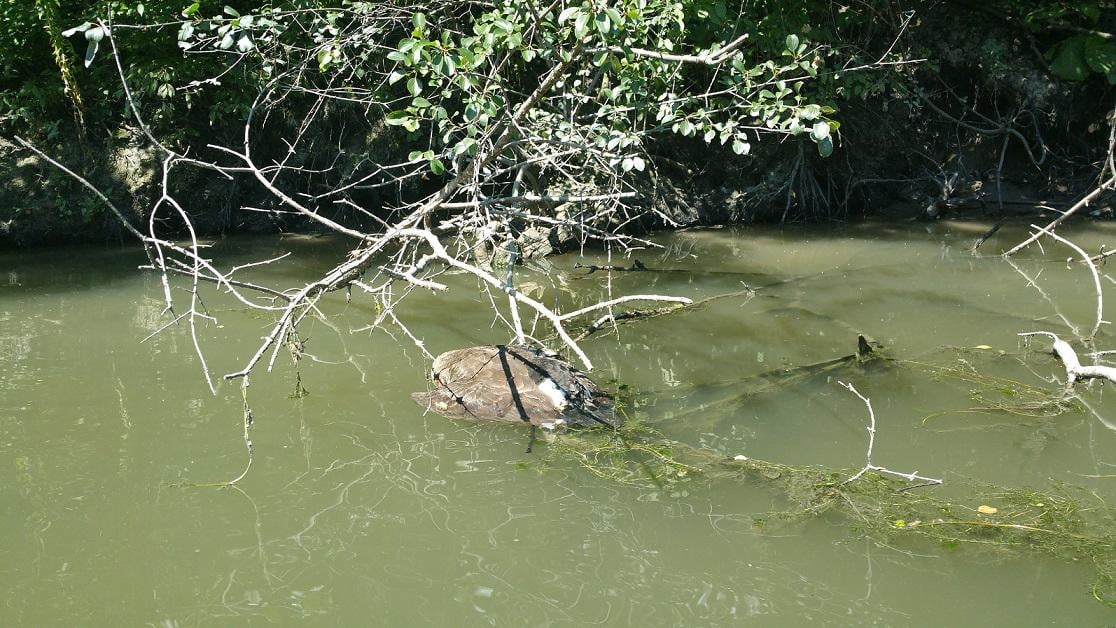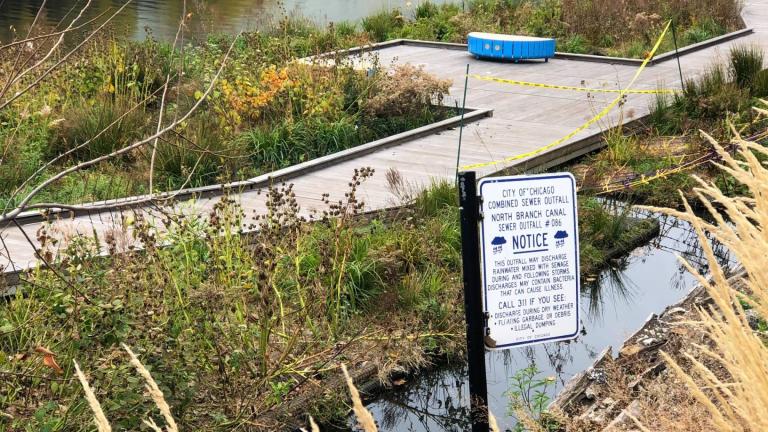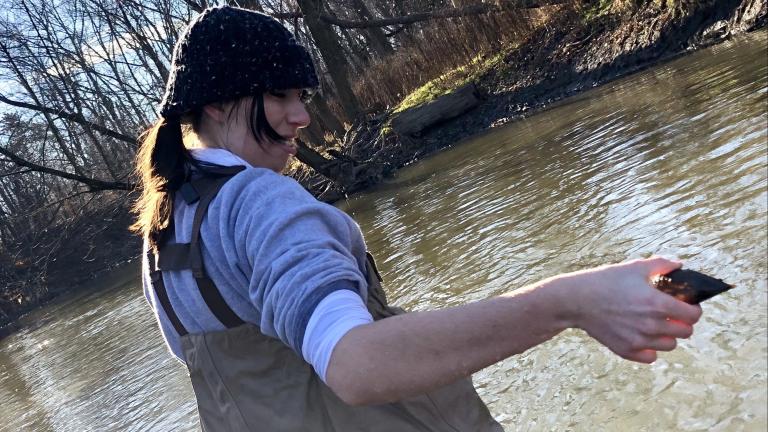 A duck found dead in the Chicago River. (Courtesy of Friends of the Chicago River)
A duck found dead in the Chicago River. (Courtesy of Friends of the Chicago River)
About 50 mallards have been found dead over the past month in multiple locations along the Chicago River, marking what one expert says is the largest occurrence of birds dying in the river in decades.
Friends of the Chicago River Executive Director Margaret Frisbie said a volunteer first reported a group of deceased ducks while paddling on the North Shore Channel on July 31. The nonprofit has since worked with the Illinois Department of Natural Resources to locate other dead ducks, about 50 in total, in four different parts of the river, Frisbie said.
“That number of birds dying on the Chicago River, the 17 years I’ve worked here, we’ve never heard of it,” she said.
Testing conducted by IDNR confirmed the cause of the rapid die-off as a bacterial disease called Botulism C, said agency spokesperson Ed Cross. The disease affects the nervous system by preventing the transmission of impulses to muscles, making birds unable to use their wings, according to the National Wildlife Health Center. Birds with paralyzed neck muscles cannot hold their heads up and often drown.
IDNR also found living ducks in the river that showed symptoms of the disease, including abnormal head movements, Cross said. The agency does not think there is risk of the disease spreading to additional birds, he said.
“To have a number like this, it is definitely something we want to make sure we are looking at and investigating to the best of our ability,” Cross said. “It's something that we're continuing to evaluate.”
Botulism C is caused by ingestion of a toxin that can be found under warm temperatures in decomposing vegetation and insects, according to the National Wildlife Health Center. Frisbie said Botulism C can grow and spread under low-flow conditions, a seasonal phenomenon marked by prolonged dry weather.
Humans are thought to be resistant to the type C Botulism toxin but can contract other forms of the disease by eating improperly preserved foods or smoked fish that is stored at too high a temperature, according to NWHC.
![]()
“That number of birds dying on the Chicago River, the 17 years I’ve worked here, we’ve never heard of it.”
—Margaret Frisbie
After the initial report in late July, Frisbie said Friends of the Chicago River learned of a cormorant found dead on the main stem of the river. The group stored the carcass at its McCormick Bridgehouse and Chicago River Museum until IDNR could retrieve it for testing.
On Tuesday, IDNR staff covered 16 miles of the river and collected all remaining carcasses, Frisbie said. Friends of the Chicago River received reports of deceased ducks on the river’s North Shore Channel, main stem, near Goose Island and farther up the North Branch.
IDNR is awaiting test results from some of the ducks but has determined Botulism C as the cause of the die-off, Cross said.
Sightings of deceased or impaired birds in the river should be reported to IDNR by calling the agency’s toll-free tip line, Cross said. The number is 1-877-236-7529.
“This is something where the public’s help becomes important,” he said. “If anybody is in that area and sees birds who aren’t moving well or don’t look like they are moving, their call to us is important.”
Contact Alex Ruppenthal: @arupp | [email protected] | (773) 509-5623
Related stories:
 City Approves Big Changes to Chicago River’s North Branch District
City Approves Big Changes to Chicago River’s North Branch District
July 26: Big changes are coming to the North Branch of the Chicago River. Why some are up in arms over the plan.
 Chicago River Cleanup Efforts Bolstered by Phosphorus Agreement
Chicago River Cleanup Efforts Bolstered by Phosphorus Agreement
Feb. 23: The Chicago River is a lot cleaner than it used to be. And after years of litigation, the Metropolitan Water Reclamation District and environmental groups have agreed to a settlement and will work together to make the river even cleaner.
 MWRD Deal Aims to Reduce Algae Pollution in Chicago River
MWRD Deal Aims to Reduce Algae Pollution in Chicago River
Jan. 25: The decadeslong fight to clean up the Chicago River took a step forward last week with the resolution of two lawsuits targeting phosphorous discharge that has polluted waters from Chicago to the Gulf of Mexico.








